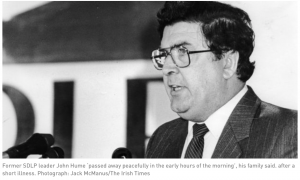The Irish Times
Former SDLP leader and Nobel laureate John Hume has died aged 83.
The current SDLP leader Colum Eastwood described him as Ireland’s “most significant and consequential political leader” of the 20th century.
Mr Hume, who spearheaded the finally successful efforts to end the violence of the Troubles and who is viewed as the architect of the 1998 Belfast Agreement, was in a nursing home and had been ill for a long time.
He is survived by his wife Pat and children, his children Terese, Aine, Aidan, John and Mo, his brothers and sisters and grandchildren.
He was centrally involved in the civil rights movement of the 1960s and served as an MP, Assembly member and MEP.
It is understood Mr Hume’s death was unrelated to the Covid-19 pandemic.
In normal circumstances, Mr Hume’s funeral would be expected to be one of the largest seen on the island for generations but due to coronavirus it must be a more restricted farewell.
The Hume family said on Monday that “John’s funeral will be arranged according to the current government regulations with very strict rules on numbers”.
They said: “We realise this will mean that many will be unable to join us and we will arrange a memorial service and a celebration of his life in due course. Above all, we know that John would have prioritised public health, and the safety and health of our communities.
“We are grateful for your condolences and support, and we appreciate that you will respect the family’s right to privacy at this time of great loss.”
Taoiseach Micheál Martin TD described Mr Hume as “a great hero and a true peace maker”.
Mr Martin said: “Throughout his long life he exhibited not just courage, but also fortitude, creativity and an utter conviction that democracy and human rights must define any modern society”.
Former British prime minister Tony Blair described him as a “political Titan and visionary who refused to believe the future had to be the same as the past”.
The SDLP leader Mr Eastwood said it was “no exaggeration to say that each and every one of us now lives in the Ireland Hume imagined – an island at peace and free to decide its own destiny”.
He added: “This is an historic moment on this island but most of all it is a moment of deep, deep sadness. In the days ahead, Ireland will be united in mourning his loss. However amidst that national mourning, it is equally true that the marking of John’s death also opens up a space to reflect on, and celebrate, the magnitude of his life.”
Mr Eastwood said that as part of the reflection on his work, never has the beatitude rung truer – “blessed be the peacemakers”.
“The life of John Hume will forever be a blessing upon this island since Ireland is now blessed by the peace he gifted to us all. It is the greatest legacy a political leader can bestow upon his country,” he said.
He added, “Hume will always find a home amongst the pantheon of great Irish leaders and it is only right and natural that he will now be spoken of in the very same breath as O’Connell and Parnell.
“It is important that John’s endeavours are fully appreciated in terms of their sheer scale – his impact and legacy extends well beyond one lifetime and well beyond the confines of Northern Ireland. His life’s work brought to an end the seemingly intractable historical arc of bitter conflict between the neighbouring islands of Britain and Ireland.
“After some 800 years which inflicted so much hurt and harm on all our peoples, it is John Hume who must now be remembered as the great healer of that history. For all of these reasons and more, John Hume truly was Ireland’s greatest.”
Offering sympathy to his wife Pat and family, Mr Eastwood said that the “Irish nation has lost a giant of its history but his family have lost a husband, a father and a grandfather”.
He said: “In the coming days, weeks and months I know that people will be eager to encase the Hume family in the very same warmth, gentleness and infectious humanity which Pat has shared with everyone she has ever met.
“It is especially poignant that John’s death has occurred as we concluded celebrations of the 50th anniversary of the Civil Rights Movement, a time which first awakened his political journey.”
Reflecting on how he was one of the chief movers of the Northern Ireland civil rights movement Mr Eastwood said that Mr Hume chose to “build a politics and a political party which was true to its time and true to the aspirations and the needs of our people”.
He said Mr Hume gave birth to a new political creed on this island that “taught us that it is far better to live for Ireland than to die for Ireland”.
“It challenged us to pursue the path of politics rather than the reactionary instinct of violence, it dared us always to choose principle ahead of easy populism and it told us that human difference doesn’t have to mean division.”
Mr Eastwood said that Mr Hume “achieved the rarest of things in a political career – he became a living statesman”.
“It is telling that John Hume remains the only person to have received the Gandhi Peace Prize, the Martin Luther King Award and of course the Nobel Peace Prize. In truth though and true to his character, the greatest reward for John was not personal recognition – it was instead found in the end to the violence and death which had taken ownership of our streets for far too long.”

